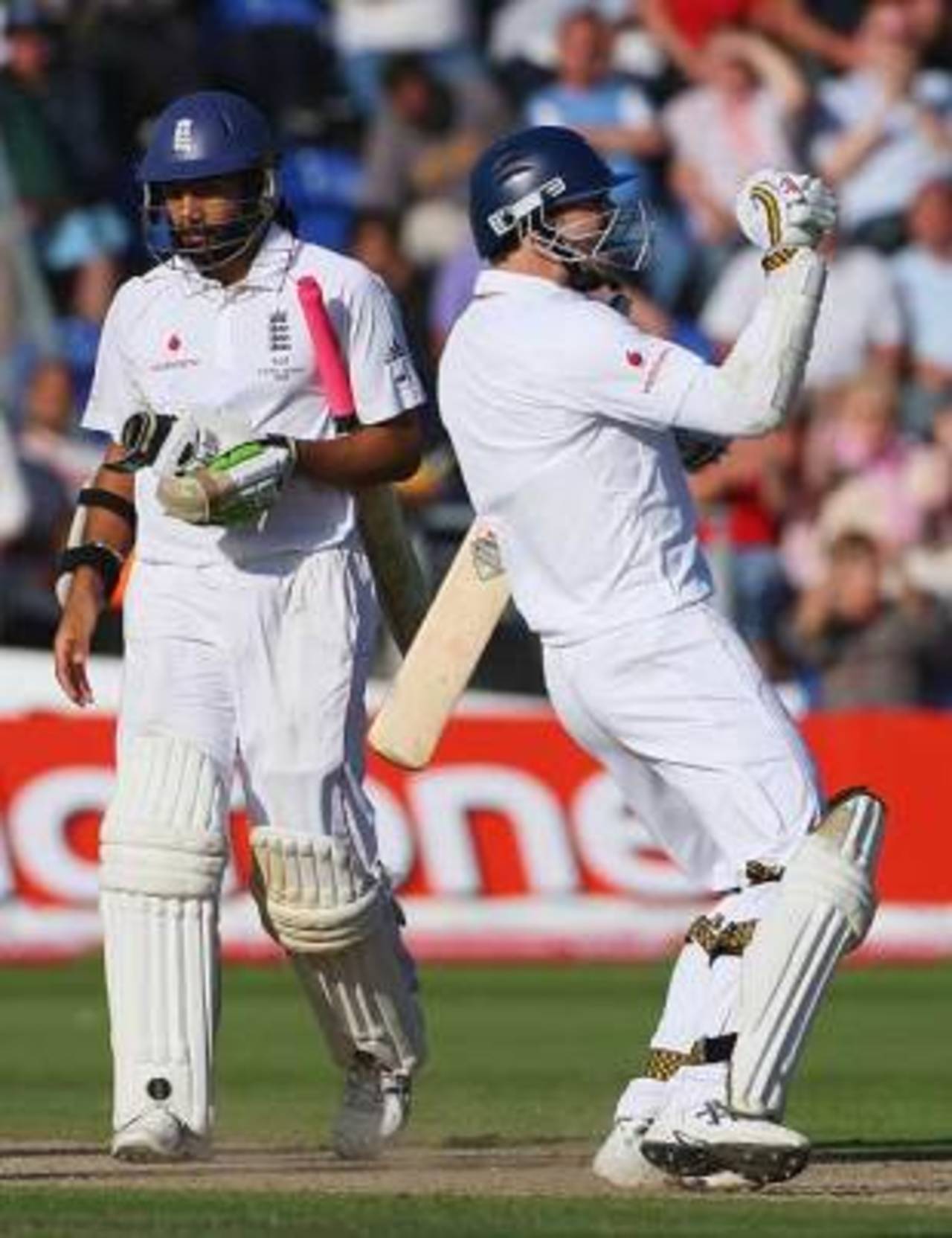Since the arrival of the Australian team to England, one question has resonated throughout the land: can the 2009 Ashes series match the drama and intrigue of four years ago? Five days into cricket's oldest and most fabled contest, it seems we have our answer. Yes. Emphatically, yes.
In the long shadows of a Cardiff evening,
James Anderson and
Monty Panesar carried the baton passed forth by
Paul Collingwood and Graeme Swann to save the first Test against a backdrop of theatre and patriotism the 20-over game will never match. Their steely determination on a day of high emotion - replete with a verbal altercation in the warm-ups, a physical confrontation in the middle and a pitch invasion, just for good measure - ensured the match lived up to the near-impossible standards of 2005, and set the stage for another enthralling Ashes summer.
That the Test was played at a time when West Indies players are striking over pay, a nomadic Pakistan team is scouting for a neutral base and Twenty20 cricket continues to erode the game's traditions only underscores its importance on a macro level. That it stirred the passions of fans on both sides of the Antipodes is also significant, albeit on a more intimate scale, given the difficult paths taken by the respective teams and supporters in recent seasons.
The image of Anderson turning to the pavilion, all smiles and fist pumps, will live long in the memory of those who witnessed it. It was, by any standard, a great escape and will go far towards restoring cricket to the forefront of the English sporting conscience, at least for the next few months.
England, undoubtedly, will draw encouragement from their stirring final day riposte, but major question marks remain over a team that was outplayed in 11 of 14 completed sessions. Paul Collingwood's stoic innings on Sunday - more notable for the 245 balls and 344 minutes absorbed than the 74 runs scored - very nearly compensated for the general lack of application of those higher up the order, but England will need many more contributors if they are to keep a voracious Australian attack at bay over the next four Tests.
Despite all the pre-match talk of accountability and responsibility, precious few of England's big-name batsmen displayed much of either. The first innings represented an en-masse fluffing of lines given the sheer volume of unconverted starts, while the second saw too many top-order specialists falling to ill-advised shots to straight deliveries.
Kevin Pietersen's modes of dismissal in both innings - and the flippancy of his first day explanation - will surely have grated with Andys Strauss and Flower, and a Sir Alex Ferguson-style "hairdryer" might not be amiss prior to Lord's. Clearly, more is needed from England's marquee batsman. The this-is-how-I-play defence has worn thin.
Pietersen, though, was not the only high-profile English batsmen guilty of questionable shot selection in Cardiff, and all would do well to take a leaf from the book of Anderson and Panesar. The courage and determination required to negotiate the snarling Peter Siddle, the challenging Ben Hilfenhaus and the probing Nathan Hauritz over 69 deliveries and 49 minutes on Sunday will be celebrated for years to come; particularly if their rearguard action marks the beginning of a broader English Ashes revival.
Yet despite the festive, febrile atmosphere of Sophia Gardens on Sunday night, England will be acutely aware that they have dodged a bullet in this Test. Much like Australia's rain-assisted escape at Old Trafford four years ago, the hosts benefited from a washed out final session on Saturday, reducing Australia's opportunity to capitalise on their hefty 239-run first innings advantage. What England have managed, however, is a blank canvas heading into Lord's. And that, following their false start in Cardiff, is invaluable.
That the Test was played at a time when West Indies players are striking over pay, a nomadic Pakistan team is scouting for a neutral base and Twenty20 cricket continues to erode the game's traditions only underscores its importance on a macro level
Though bitterly disappointed they could not prise loose England's final wicket on Sunday, Australia has reasonable cause for positivity. Fortune seemed stacked against the tourists from the start of this match, beginning with Brett Lee's match-ending injury and the memories of Edgbaston, 2005 it evoked. Denied the services of their only 300-wicket taker, Australia entered the match with a four-man attack whose combined Test experience amounted to just 35 matches, 21 of which belonged to Mitchell Johnson.
Those baggy greenhorns were immediately put to work after Ponting lost an important toss on a docile pitch. With Johnson failing to reach the talismanic heights of South Africa, it was left to the rookie combination of Hilfenhaus and Siddle to hammer away on a thankless surface. Both impressed with their unrelenting vigour, if not always their direction, and were ably supported by Hauritz, Australia's most maligned Ashes spinner in a generation.
That foursome has almost certainly secured safe passage into the starting XI for Lord's, meaning that the tourists will enter the second Test with 400-wickets worth of experience in Lee and Stuart Clark on the bench. But not all is rosy in the tourist's camp. An inability to take more than seven wickets on a fifth day pitch will reprise memories of recent disappointments in India and Australia, and reinforce - as if it was needed - the realities of life in the post-Warne era.
Alex Brown is deputy editor of Cricinfo
